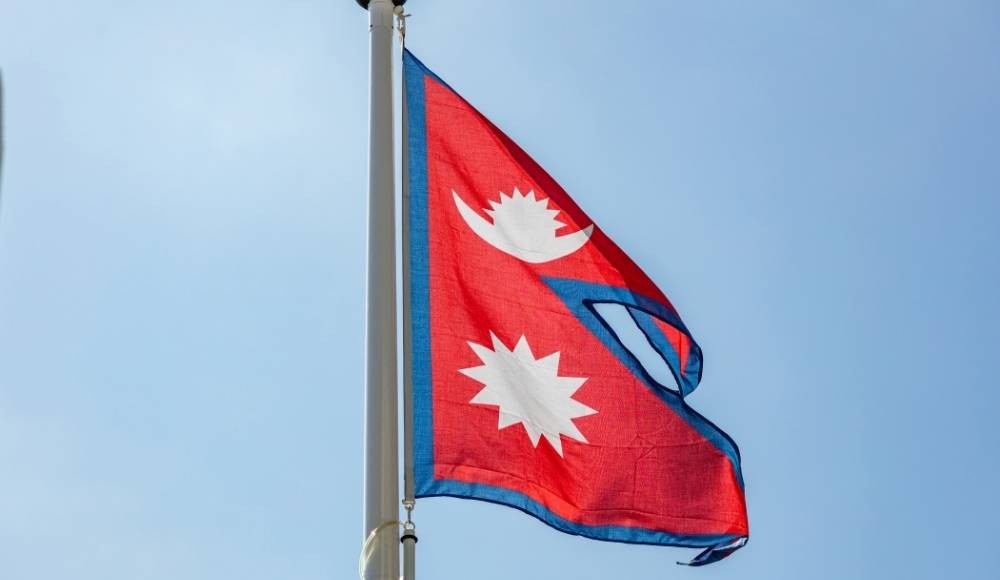Nepal Flag – A Unique Flag in the World
The original flag of Nepal can be drawn only through the mathematical process. It is considered as the most mathematical flag of the world in existence.
The original flag of Nepal can be drawn only through the mathematical process. It is considered as the most mathematical flag of the world in existence.


The only triangular flag in the world is the flag of Nepal. The flag of Nepal is made from two triangular pennants. Everything in Nepal's flag has meaning: from its shape, to the colours used and the symbols inside the flag. The national flag of Nepal is the identity of both the nation as well as the Nepalese.
The original flag of Nepal can be drawn only through the mathematical process. It is considered as the most mathematical flag of the world in existence. In the original flag, there were faces of the sun and the moon. Similarly, the basic design of the modern flag of Nepal is taken from the original flag.
The modern flag was adopted on 16th December, 1962. The faces were removed from it to give it a modern look. Meanwhile, the actual size and the ways to draw the flag of Nepal is also written in the constitution of Nepal.
|
Shape |
Triangular |
|
Nicknames |
Triangle Flag, Chandra ra Surya |
|
Adopted on |
16 December 1962 |
|
Colours Used |
Crimson Red, Blue and White |
|
Symbols Inside Flag |
Sun and Moon |
|
First Adopted By |
Prithivi Narayan Shah |
|
Dimension Ratio |
3:4 |
The mathematical flag of Nepal is different and unique from the rest of the world. From its past days, till now, the actual shape, size and the colours used in the flag is as usual. However, there used to be faces on the moon and the sun which was later removed to give it a modern look to the flag. In addition, there is a deeper meaning in every aspect of the flag. The shape, colour and even symbol represent something. As long as there is the existence of the sun and moon in the universe, Nepal will maintain its entity.
The flag of Nepal is made up of 3 different colours: Crimson Red, Blue and white. The main color used in the flag is Crimson Red which is also the national color of Nepal. Similarly, crimson red is also the color of the national flower of Nepal, Rhododendron.
In addition, Khukuri is the national weapon of Nepal. The crimson red color represents the brave spirits of the people of Nepal. The Blue color is used in the borders of the flag. This represents the peace and harmony in the nation. And the sun and moon are white in color which represents light and awakening.
The sun and the moon represent permanence. It represents that Nepal will last as long as the sun and moon in the sky. The flag of Nepal is not only mathematical, but it’s also astrological and geographical too. There are 8 petals on the moon and 12 petals on the sun. Meanwhile, the 8 petals on the moon represent the 8 phases of the moon. Similarly, the 12 petals on the sun represent the 12 stages of the sun. So there is a saying in Nepal that “There will be Nepal till the end of the universe, till the moon and sun complete the full cycle of their life”.
Nepal Flag Before 16 December 1962
The sun in the Nepal flag symbolizes fierce resolve whereas the moon symbolizes that the Nepalese are soothing and calm. People also say that the moon represents shades and the cool weather in the Hilly region and Himalayan region. Similarly, the sun represents the heat and high temperature in the terai region of Nepal.
It is easy to make a rough sketch of the flag of Nepal. But there is an exact mathematical formula to make a perfect flag of Nepal. Likewise, The method of how to make the perfect size of the Nepal flag is written in Schedule 1, Clause 2 of Article 8 of the Nepal constitution. In addition, there are 24 mathematical steps to draw the flag of Nepal.
On the lower portion of a crimson red cloth draw a line AB of the required length from left to right.
From A draw a line AC perpendicular to AB making AC equal to AB plus one-third AB. From AC mark off D making line AD equal to line AB. Join BD.
From BD mark off E making BE equal to AB.
Touching E draws a line FG, starting from the point F on line AC, parallel to AB to the right-hand-side. Mark off FG equal to AB.
Join CG.
From AB mark off AH making AH equal to one-fourth of line AB and starting from H draw a line HI parallel to line AC touching line CG at the point I.
Bisect CF at J and draw a line JK parallel to AB touching CG at point K.
Let L be the point where lines JK and HI cut one another.
Join JG.
Let M be the point where line JG and HI cut one another.
With centre M and with a distance shortest from M to BD mark off N on the lower portion of line HI
Touching M and starting from O, a point on AC, draw a line from left to right parallel to AB.
With centre L and radius LN draw a semi-circle on the lower portion and let P and Q be the points where it touches the line OM respectively.
Making the centre M and radius, MQ draws a semi-circle on the lower portion touching P and Q.
With centre N and radius NM draw an arc touching PNQ at R and S. Join RS. Let T be the point where RS and HI cut one another.
With centre T and radius TS draw a semi-circle on the upper portion of PNQ touching it at two points.
With centre T and radius TM draw an arc on the upper portion of PNQ touching at two points.
Eight equal and similar triangles of the moon are to be made in the space lying inside the semi-circle of No. (11) and outside the arc of No. (12) of this Schedule.
Bisect line AF at U, and draw a line UV parallel to AB line touching line BE at V.
With centre W, the point where HI and UV cut one another and radius MN draw a circle.
With centre W and radius, LN draws a circle.
Twelve equal and similar triangles of the sun are to be made in the space enclosed by the circles of No. (2) and No. (3) with the two apexes of two triangles touching line HI.
The width of the border will be equal to the width of TN. This will be of deep blue colour and will be provided on all the sides of the flag. However, on the five angles of the flag, the external angles will be equal to the internal angles.
The above-mentioned border will be provided if the flag is to be used with a rope. On the other hand, if it is to be hoisted on a pole, the hole on the border on the side AC can be extended according to requirements.
On 23 August 2014, an event took place at Tudikhel, Kathmandu organized by the Human Values for Peace and Prosperity. At this event, more than 35,000 people participated to form the largest human flag of Nepal. Previously Pakistan held the record for Largest Human Flag with more than 29,000 people participating. The main motive of this event is to spread the message all over Nepal that all of the Nepalese stay under the same flag.
Meanwhile, a helicopter was also used to take the picture as well as videos of the event and was later sent to the Guinness World Record for the verification. An NGO of Nepal (Human Values for Peace and Prosperity) played a vital role in this event carrying the slogan “Breaking the records to unite the hearts.”
our first-hand Himalayan travel experience